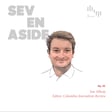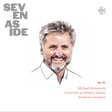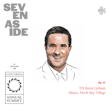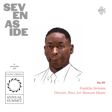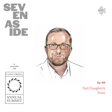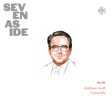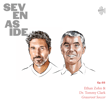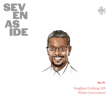Become a Creator today!Start creating today - Share your story with the world!
Start for free
00:00:00
00:00:01

TH Daniella Levine Cava
The mayor of Miami-Dade County on the transit experience awaiting visitors when they touch down for FIFA World Cup 2026; moving the needle—in the “good direction”—on FEMA ratings; her secret to marshalling federal resources; achieving consensus among a dynamic electorate; and her administration's priorities for the next four years
This episode is part of a spotlight on Miami for Kit Magazine's series on cities and sustainable development: https://kit-magazine.co/football-and-the-global-city/
Transcript
Mayor Cava's Re-election and COVID-19 Innovations
00:00:11
Speaker
Stay the Course is an animating principle of an agenda that, as of the publication of this episode, has helped Miami-Dade Mayor Daniela Levine-Kava cruise to a second consecutive term. It's the mark of confidence in a tenure and blueprint, both taking root amid the COVID-19 pandemic, that defined a contemporary Miami embracing its extraordinary opportunities and spirit of innovation to enhance prosperity, security, and quality of life for all Miamians. This, while remaining an envy among its superstar siblings in terms of talent and wealth and flow.
00:00:39
Speaker
Then again, Miami is no status quo place, stresses Levine Kava, whose pensions for collaboration, breaking the structural mode and, quote, taking care of business, met a moment when private and federal investment were flowing in historic abundance. Her administration's exemplary attention to climate resiliency, labor, housing, mobility and mental health bear testament.
00:00:57
Speaker
If World Cup 2026 is any city's moment in the sun, it is indeed Miami's.
World Cup 2026 Preparations: Transit and Infrastructure
00:01:02
Speaker
In this latest in our spotlight on the Magic City, the newly re-elected Mayor Levine Cava, no less the head of Miami's World Cup Committee's advisory board, sheds light on the transit experience awaiting visitors when they touch down for the tournament, talks about moving the needle in the good direction on FEMA ratings, spills her secret sauce for marshalling federal resources, and gives us a sense for priorities for the next four years.
00:01:27
Speaker
Without ado, Mayor Daniela Levine Kava, thank you so much for for joining us. um In your state of the county earlier this year, you come back to this notion of the so-called new economy. ah For the purposes of this conversation, that's as good a place as any to start. Explain, if you would, what that means and entails. What what are the pillars of the new economy as you see them?
Innovation and Equity in Miami's Economy
00:01:49
Speaker
Yes, so we are really the canary in the coal mine for so many things. And so we have to be smarter and we have to be future ready. So we've been using that terminology to think about how we deal with climate challenges, how we deal with equity challenges, how we have an economy that works for everyone, the rising tide, lifting all boats. So we're very blessed that we have incredible DNA of innovation. We have now so much more capital.
00:02:23
Speaker
being invested here in our entrepreneurial space. And we want to be sure that it's done in a way that really benefits the people in the planet. in the short run in into very short years. In fact, Miami will be in the throes of the world's biggest sporting bonanza. And if recent history is any clue, record heat and storm activity. um Looking to 2026 and beyond, how how is Miami-Dade, tactically speaking, upping its climate preparedness and decarbonization agenda?
Miami's Zero Carbon Goal by 2050
00:02:54
Speaker
We have a very aggressive agenda. We are heading to
00:02:59
Speaker
zero carbon by 2050 and 50% by 2030. And we have really all the partners, the private sector, the public sector, electrifying our fleet, going solar on our buildings, producing more EV charging stations throughout our our county for plug-in.
00:03:24
Speaker
and we We are recognized in the world for our resilience efforts. We have the first in the world chief heat officer. We focus on our water asset, which is really our blue our blue heart of our economy, the Bay, Biscayne Bay and the ocean. We're doubling down on coral restoration, so many so many things. So we have been declared ah by the US Department of Commerce economic development administration as one of 31 tech hubs in the country. We are the only one designated as the climate tech hub. So that is a testament not only to our challenges, but to our very aggressive measures to address climate throughout our economy. Thinking of the tournament in particular, how can
00:04:17
Speaker
tournament goers participants be assured of safe contingencies for the storm activity and the and the heat waves and so forth.
Transit System Enhancements for World Cup
00:04:25
Speaker
Well, of course, air conditioning is our friend. It's what makes Florida, Florida. ah So we have that. But we're also investing in more efficient cooling systems. HVAC and taking moisture out of the air. It's one of the pillars of our climate tech hub. We'll be training people locally to be HVAC installers.
00:04:46
Speaker
It's something that doesn't require a lot of formal education. And so good jobs for a resilient future that uses less electricity. Our transit system, of course, which has been recently really upped. We're moving, you have to have world-class transit as a world-class metro. And we have revamped our bus system after 40 years of status quo.
00:05:13
Speaker
We're aggressively building out some of our rapid corridors that will you know be ready. Some of them will be ready in time for World Cup. And we certainly are very, very savvy when it comes to extreme weather. Just as an example, FEMA, which does the flood rating Readiness rating rating moved us from a five to a three. That's the good direction, unprecedented for anybody to move two classes in one cycle. And this has led to a 35% reduction in our flood insurance rates across the county. So we're we are working aggressively on investing in infrastructure to make it more climate ready. And we brought down 1.5 billion.
00:06:02
Speaker
in federal and state ah competitive grants focused on infrastructure, a lot of it having to do with climate. Well, I'm glad you touched on the transportation piece. Miami is very much a car town. Vehicle congestion is an issue. um Public transit in my experience is quite good, provided one can readily access it.
00:06:23
Speaker
When tournament goers touchdown in 2026, for instance, what you know from the from the airport to the Metro to cycling and pedestrian thoroughfares, might they experience that differs from today? Yeah. So first of all, the airport. We are perhaps the fastest growing airport in the country. We have we were the top international ah During pandemic now, we're back to number two as an international hub across the world combining commerce and passengers We're number 10 busiest airport. So we have more airlines than any airport in the United States at about a hundred and So we know that our it's 10% year-over-year that we're growing. So we have new terminals coming online we have a new parking garage coming online and um
00:07:12
Speaker
ah we we We're working super hard to make up for past years of deferred maintenance to make sure our conveyances are are working up to snuff and all of that. ah But once you get out of the airport, we are going to be working on streamlined bus system and utilization of the train where it is available. we ah you know That's our commitment that we made when we pitched to to be a host site. We are building a a line that goes straight up to the Hard Rock Stadium. But unfortunately, I don't think it's going to be ready as an elevated rail, which is the the plan, the intended plan in time. But the corridor does exist. And so we'll be able to really fast track transit on on that corridor.
00:08:05
Speaker
to coordinate and not have everybody showing up in individual cars to the event. As far as bicycling goes, of course, we're bicycle friendly all year long, and we have a system of trails that are aggressively being built out. One called the Underline, which goes under the elevated metro rail tracks, is truly going to be iconic. It's already drawing people for exercise, recreation, all kinds of activities. It's like a park. it's It is a park. It's a linear park, and it's it's it's a great amenity for relaxation as well as transportation. And a close cousin to New York is the High Line, if I'm not mistaken. Sticking with the mobility picture, your Shift 305 transportation plan stresses, quote, tech at the highest levels system-wide. How does that manifest?
00:09:00
Speaker
We definitely are using all the apps and they are interrelating. The cities, by the way, have some of their own systems that articulate to the county system. And one of my initiatives before I was mayor as county commissioner was to make sure that they really did talk to each other. And as we've rolled out this new bus configuration called the Better Bus Network, we've worked with the cities to to really make sure that these things were complementary and not redundant.
00:09:29
Speaker
So we we're rolling out really improvements more or less every month. We have something called Metro Link, which is a system of smaller buses that go on some of the feeder routes. People are going to be very happy when these routes roll out. And, um you know, we are growing our transit ridership. We're not in New York City with High penetration, we're rather low relative, like you say, at car culture. But as we are building densely along these transit corridors, like the metro rail line that goes ah south and north, we are creating incentives for more density, fewer requirements for parking, for cars. And these are filling up immediately. They're highly, highly popular. People do want to give up cars. So we've also added express buses in a number of routes.
00:10:20
Speaker
that are also drawing new passengers. We have dedicated bus lane on 836, which is the major east-west highway that does go to the airport as well. So we we come up with various ways to lure people who have the choice out of their cars. And I just see this growing as people realize that we do have a system that will get them where they need to go as we've increased frequency on those ah most
Securing Funding for Infrastructure Projects
00:10:46
Speaker
ah high demand routes.
00:10:48
Speaker
As you touched on, federal support is crucial to so much of of this so many of these initiatives, yet it's not always obvious and in many jurisdictions how funding from the IRA, for instance, is being channeled. what is what is your secret how How has the administration pulled down support from the big national infrastructure and climate bills of late? so What has been your strategy? so Collaboration is my middle name. and We have a 30,000 employee operation here, almost $12 billion dollars budget.
00:11:18
Speaker
And we immediately created a cross-team infrastructure working group. They meet weekly. They look at every offering. We have actually, Mitch Landrieu told me, you know, I should tell others what we're doing. And I said, not so much. We have been very successful, but also we understand the priorities of the Biden administration are very much concurrent with ours on equity and resilience issues. so I think that's been part of our secret ah sauce. We also work with our cities. So I'm the mayor of the county, almost 3 million people, but within the county, about half has incorporated cities. That's 34 separate municipalities. And each of them has an opportunity to pitch their grant ideas. And we have supported them because we live in 1-305, we call it, even though now we have a few other ah area codes.
00:12:15
Speaker
we We all occupy the same space, drink the same water and breathe the same air and use the same transit system and go to the same jobs and schools, et cetera. So we have to really work together.
00:12:30
Speaker
It's no secret that Miami-Dade has seen an explosion of wealth, private citizens, high finance, property development, foreign investment, so to speak, ah in the last few years alone. On this idea of the new economy and and thinking about the litany of contemporary issues so many cities face, affordability and income disparity behind the list, how does Miami-Dade work to ensure the spoils of its growth and success accrue to the many
Tackling Income Disparity and Housing Affordability
00:12:53
Speaker
and not just the few? And you you touched on upscaling and worker training before, but wondering if you could elaborate a bit.
00:12:59
Speaker
well Personally, this has been the work of my lifetime. So I come to this job deeply, deeply committed to making sure that there's opportunity for all. And truthfully, Miami-Dade County is a mecca for the world, for people coming to achieve their American dream. And so we're very welcoming. We're 50% foreign born, 70% Spanish speaking, right? So we have. and a large Haitian and Caribbean population. So we're very, very proud of our diversity, all of the Latin and Caribbean nations that make their way here. ah So and many of those are entrepreneurial of necessity. They may not be able to enter the economy at the level even of their prior training or job from their home country. And they are bringing with them their cultural or
00:13:59
Speaker
astronomical talents and enriching us and and very entrepreneurial. so And I think also it's attracting the businesses that have especially been coming ah post, well, even during during COVID, but post COVID, that they see this diversity in the workplace, and that is a big driver for them. So we're we're really aligned here. we And we recognize now, especially, that with this new wealth comes a special resp responsibility to support our workers. The immigration, if you will,
00:14:34
Speaker
or migration from the north and and the west of this country to Miami has led to increase in cost of living. So we have New York prices without New York salaries, and people are really, really struggling to to pay the increased housing costs. So we're working feverishly to build new units, to subsidize, to refurbish, to maintain those naturally occurring affordable ah places that people live,
00:15:03
Speaker
And ah our Office of Innovation and Economic Development is really premised on exactly that, making sure that there's opportunity, that the workforce is retooled, and that we all benefit from this innovation economy.
00:15:20
Speaker
As you say, Miami is unique to the American character and spirit. And when World Cup rolls around, you, Mayor Cava, will presumably be mid second term. ah With that in mind, I hope you would indulge um ah a multi-part question. First, what do you want the world to understand about Miami and take away from its experience there in 2026? I really believe that we are the future. We have experienced and embraced and profited from the incredible diversity, from the people who come here seeking not only the American dream, but freedom, that they bring their their innovation, their culture, that those who were here before are really embracing of that change. So we're very we're very agile and very adept. And plus we live in paradise. It's beautiful.
00:16:17
Speaker
ah And this is is just culturally rich and so in so many ways, the quality of life here is is outstanding. So we want people to experience that. We want them to to come and contribute. We are very open to new leadership emerging, new ideas.
00:16:39
Speaker
We are not a state or status quo place at all. So since the only constant is change and we embrace change, that I think is the key takeaway. We're not without challenges. Obviously, we have extreme weather. We have the seas rising. We have the the challenges of those immigration trends.
00:17:01
Speaker
But again, each of those challenges creates great opportunities for us. And we want to show the world that we are aggressively tackling those things. For example, we have our Miami-Dade Innovation Authority that was created, modeled after the Israel Innovation Authority, that specifically takes those challenges and turns them into economic opportunities. And we work with our university and college and and K-12 system to prepare people to be ready for this emerging economy. And um we we are investing in it and we really see that and we work as a great ecosystem and we work well together. Well, second, as a Democrat who seems to enjoy broad support, what are the keys to winning over such a diverse, influential, often misread constituency and the one that is increasingly the makeup of the national body politic?
00:17:57
Speaker
Look, ah people know that I'm taking care of business and that I am taking care of people. So i I recognize that for the economy to work and people to be able to live in paradise, we have to make sure that there are good jobs, jobs that pay adequately for ah cost of living and jobs that provide good quality of life. So I am considered business friendly and I am. And those are businesses that also recognize their interdependence on the environment and on the people. So I think people trust me because I've demonstrated I care. They trust me because I follow through um and
00:18:41
Speaker
I am in a nonpartisan seat, which is a great advantage, and I do enjoy broad bipartisan ah support as well as from independents. Thirdly, at Concordia America Summit and Climate Week, you emphasize nature-based climate solutions, biodiversity as a second term priority. What is your vision for the next four years? What what is your pitch for re-election? Well, I definitely want to stay the course. We have launched an incredible number of innovative practices inside government. The first ever Office of Equity and Engagement, a very participatory those way that we deal with the public. Customer service, it's all customer service. we're They're the customers we're providing the service. They're paying for it and we need to be accountable. um The housing crisis, which is very, very real and we've tackled it
00:19:37
Speaker
very aggressively, but it is not solved, so we must continue. And we do need to make sure that our businesses recognize that they are part of the, well, they're part of the problem by the fact that it's so expensive to live here, they've moved their businesses, but they can be part of the solution. So we're working very creatively with our businesses to to make sure that we can all continue to benefit. So all of that is staying the course. Definitely, we know that We are challenged from an environmental perspective. Our Bay is our lifeline in so many ways. Our Blue Heart, as I've said, it's a $64 billion dollars impact on our economy. And we have to be even more aggressive getting people to understand what they can do to protect and preserve our paradise.
Prioritizing Mental Health and Biodiversity
00:20:28
Speaker
ah So I feel very strongly that more engagement around resilience is critically important. And I'm also concerned about our mental well-being, our emotional health. We've been through just devastating times through the pandemic, people still isolated alone.
00:20:49
Speaker
50% of our gun deaths are suicides. So you know this is a very little discussed, that's not an exact figure, but in the range of, and we are not doing enough as a community to to really check in and see how we can support people, to feel connected, to feel supported, ah to be part of community. And I plan to aggressively get involved in in those things. And you mentioned biodiversity.
00:21:19
Speaker
We're losing species at a rapid rate. Part of our paradise is the flora, the fauna, in the water, on the land, it's the birds. We we definitely know that our impact on the environment is reducing that biodiversity. And again, this is something I hope that we can bring greater awareness to and motivate people to be greater stewards of the planet.
00:21:50
Speaker
I am the um proud owner of a ah of a rescue, a pot cake from the Bahamas. And I was struck by your emphasis on animal shelters in your state of the county. It's not something we we hear terribly often. How, for you, is this a priority? Why why are animal welfare and the shelter system issues worth calling attention to as a civic matter? People love their pets. And they are family members. We have, like the rest of the nation, a major problem with animal abandonment.
00:22:20
Speaker
Because again, in the pandemic, people did take pets home and then for a variety of reasons, they have needed to give them up. I was speaking to a group of Realtors yesterday and it was about the cost of repairing condominiums and being safe after the Surfside Champlain Tower South collapse, ah which we've done so much to make our buildings safer and protect people with transparent access to information and the like.
00:22:47
Speaker
But they asked me as a closer, what else would I like them to know? And I said, I need you to talk to landlords and make sure that they understand how important it is to let people bring their pets into their rental units. It's just honestly, with the the competition for available housing, landlords have gotten pickier and it is flooding our shelters. We built a brand new shelter and when I was a county commissioner just a few years ago.
00:23:16
Speaker
It was at full capacity. And then our former shelter, which really was just there for quarantine, has now filled up as well. And we have a no kill policy, which we have adhered to religiously. So any pet that is not ah vicious or on death's door will be allowed to continue at our shelter until adopted.
00:23:42
Speaker
and we are aggressively promoting adoptions and fosters and short-term trips with the dog for the weekend or the day, whatever, to and volunteers. So we have a huge, huge population of animal lovers, and we want them to help us to really get, wrap our hands around this problem. We are looking at how, you know, we don't want more animals to come to the shelter. We want them to have forever homes. So we're working hard on it.
Animal Welfare and Community Engagement
00:24:15
Speaker
Whether through donation, adoption, or simply giving a cat or dog a break from the shelter for a few days, we all can help Miami-Dade's deserving animals in need and support their heroic human caregivers. Visit the animal services page at miamidade.gov to find out more.
00:24:30
Speaker
This interview with Mayor Daniela Levine Cava anchors a special print edition of Football in the Global City timed for Concordia Annual Summit in New York City. To request a copy, visit the about page at www.kit-magazine.co.
00:24:43
Speaker
Otherwise, join KIT publisher Santiago and hundreds of delegates from the business, policy, and advocacy communities for three days of eclectic programming and provocative dialogue zeroed in on issues of global import. 2024 Concordia Annual Summit runs September 23rd until the 25th. The complete agenda, speaker lineup, and all other particulars can be found at www.concordia dot.net.
00:25:04
Speaker
Thanks once again to this episode's guest, Mayor Daniel Levine Cava, and a special thanks to friend of KIT Magazine, Brian Burns. Signing off for Studio Santiago and KIT, I'm Eben Howell.


